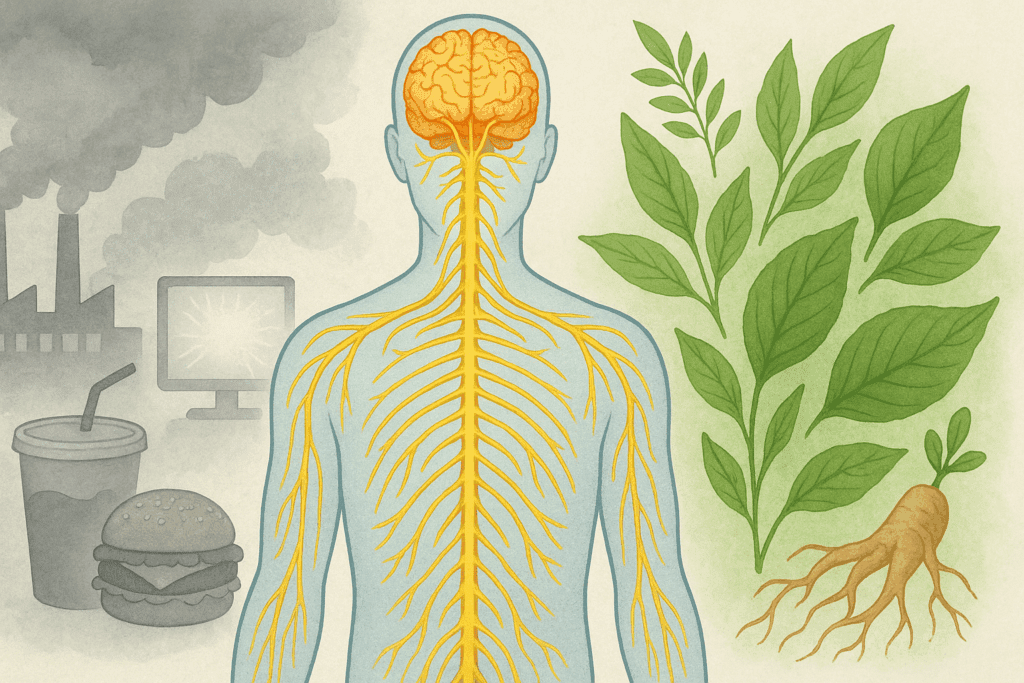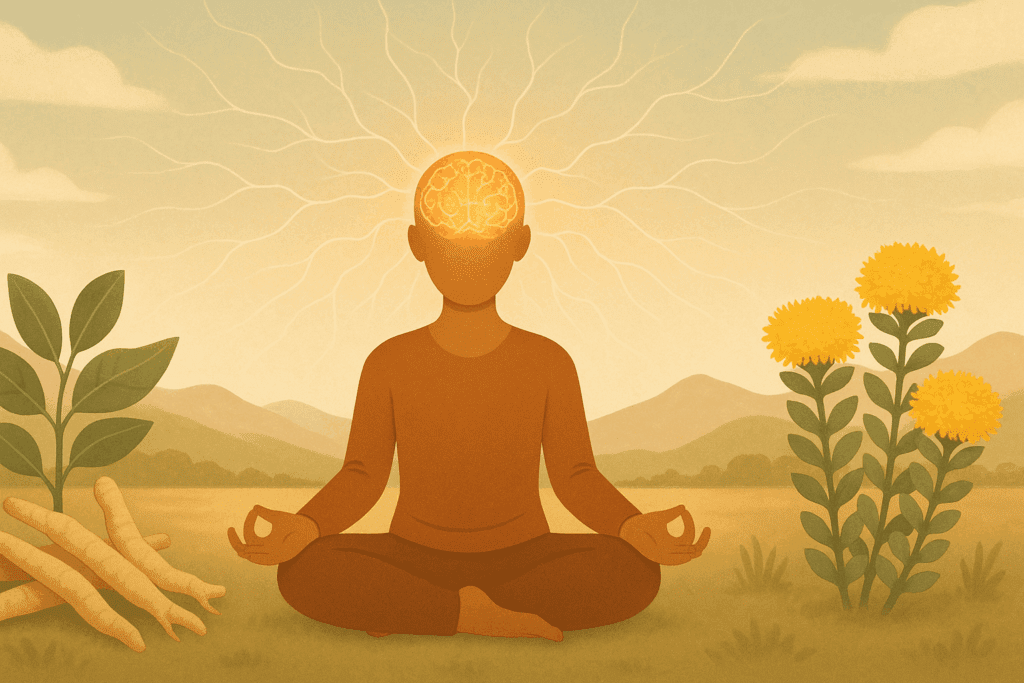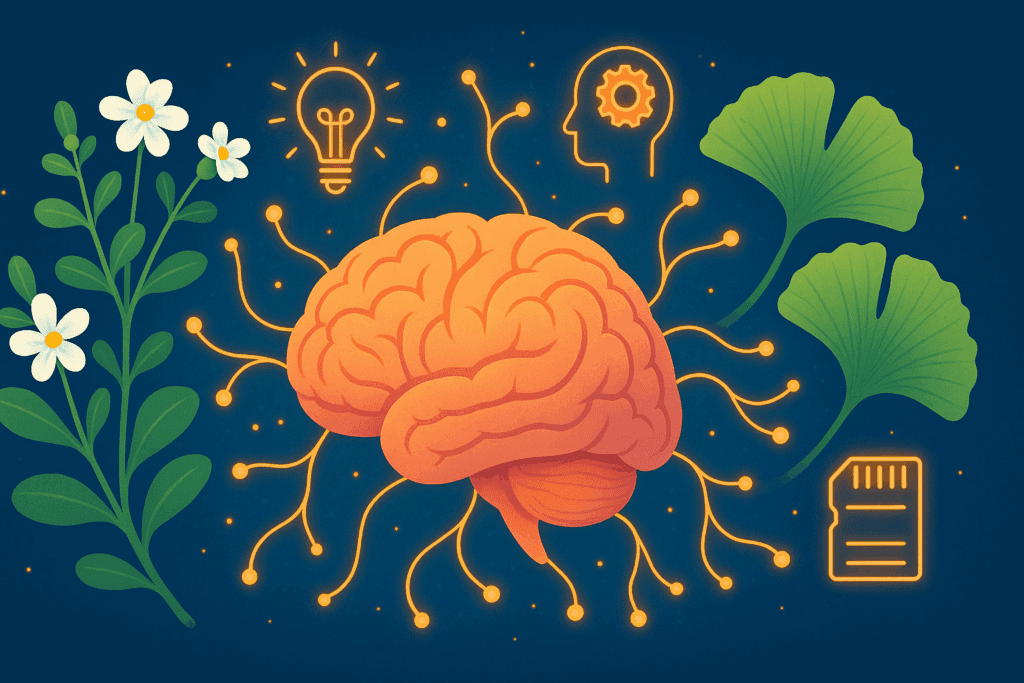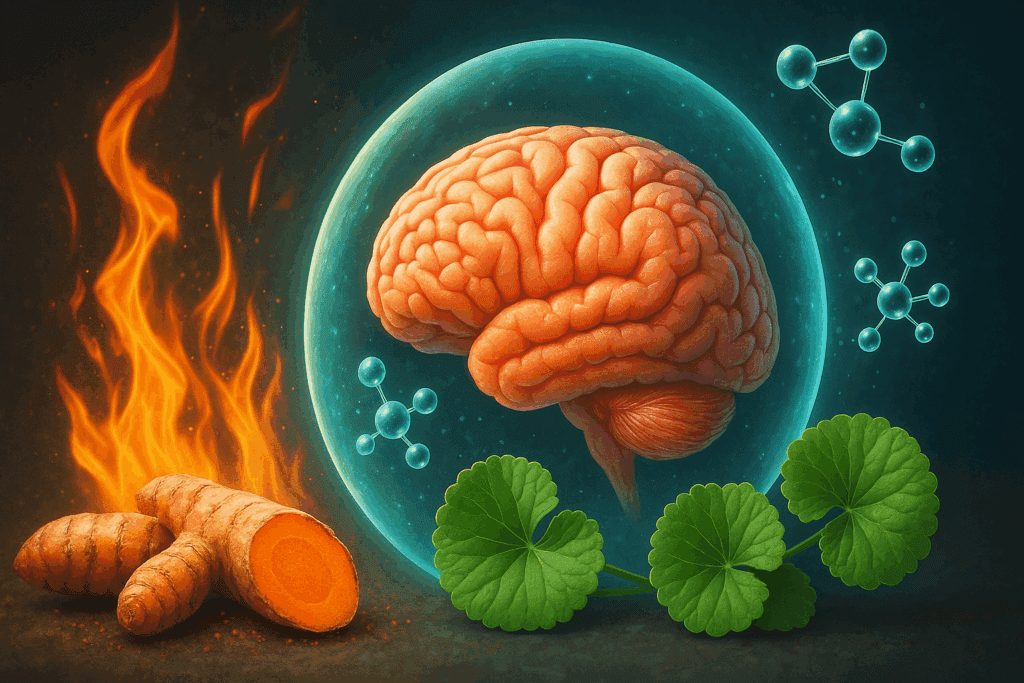Introduction: The Growing Interest in Natural Cognitive Wellness
In today’s fast-paced world, maintaining optimal brain and nervous system health has become a priority for many. With an ever-increasing reliance on mental performance, emotional resilience, and stress management, individuals are turning to natural solutions to enhance cognitive wellness. Herbs that cleanse the nervous system and support brain health have captured significant attention, driven by the desire for holistic, side-effect-minimizing approaches. Rooted in centuries of traditional medicine and supported increasingly by scientific research, these botanicals offer fascinating potential for those seeking to nurture both mind and body. This article explores the best herbs for brain and nervous system health, delving deeply into their mechanisms, benefits, and applications. By understanding the role of these herbs, we can make informed decisions about integrating them into our daily routines, ultimately supporting long-term cognitive clarity and vitality.
You may also like: Where to Buy Bacopa Monnieri: How to Find Quality Supplements for Cognitive and Memory Support
Understanding the Brain and Nervous System: Why Herbal Support Matters
The brain and nervous system are the body’s communication command centers. They regulate everything from heartbeat and digestion to thought processes, emotions, and memory. Given the centrality of these systems to overall health, it is no wonder that even subtle imbalances can have profound effects. Environmental toxins, chronic stress, poor diet, and aging can lead to oxidative damage, inflammation, and impaired neuronal communication. Over time, these factors may contribute to brain fog, anxiety, cognitive decline, and even neurodegenerative diseases.
Herbs that cleanse the nervous system can help counteract these challenges by supporting detoxification pathways, reducing inflammation, and promoting neuroprotection. By using herbs for brain and nervous system support, individuals may experience improved memory, sharper focus, greater emotional resilience, and enhanced overall wellbeing. Importantly, many of these botanicals do not just mask symptoms; they work at the cellular level to foster lasting health and balance.

Adaptogens: Nature’s Stress Managers for Brain and Nervous System Health
Adaptogens are a class of herbs renowned for their ability to help the body adapt to physical, emotional, and environmental stress. These powerful plants balance the hypothalamic-pituitary-adrenal (HPA) axis, which plays a critical role in the body’s stress response. Chronic HPA axis dysfunction can impair nervous system function, leading to cognitive decline, depression, and anxiety. By modulating stress responses, adaptogens indirectly bolster brain and nervous system resilience.
Ashwagandha (Withania somnifera) is a standout adaptogen that has been shown in studies to reduce cortisol levels, enhance memory, and improve reaction time. Another remarkable herb, Rhodiola rosea, enhances the brain’s resistance to stress while supporting neurotransmitter balance. These herbs that cleanse the nervous system work gently but powerfully, improving energy and mood without overstimulation. When incorporated into a regular wellness regimen, adaptogens offer a foundation for long-term cognitive health.
Nootropic Herbs: Natural Boosters of Cognitive Performance
The term “nootropic” refers to substances that enhance cognitive function, particularly executive functions like memory, creativity, and motivation. While synthetic nootropics have gained popularity, many traditional herbs also possess nootropic properties. These herbs for brain and nervous system support not only boost mental performance but often contribute to neurological health in broader ways.
Bacopa monnieri, often called Brahmi in Ayurvedic medicine, is a classic example. Clinical studies have shown that Bacopa can improve memory recall, attention, and information processing speed. It achieves these effects in part by modulating key neurotransmitters and reducing oxidative stress. Another powerful nootropic herb is Ginkgo biloba, celebrated for enhancing blood flow to the brain and supporting cognitive longevity. Regular use of these herbs, combined with a brain-healthy lifestyle, can offer a natural and sustainable way to sharpen the mind.
Anti-Inflammatory and Antioxidant Herbs for Neurological Protection
Neuroinflammation and oxidative stress are two of the primary drivers behind cognitive dysfunction and neurological diseases. Addressing these root causes is essential for preserving brain health over the long term. Herbs that cleanse the nervous system often exert strong anti-inflammatory and antioxidant effects, providing critical protection at the cellular level.
Turmeric (Curcuma longa) is perhaps the most famous anti-inflammatory herb, with curcumin as its active component. Curcumin crosses the blood-brain barrier and has been shown to inhibit inflammatory pathways associated with neurodegeneration. Likewise, Gotu kola (Centella asiatica) enhances collagen synthesis and microcirculation, aiding in nervous system repair while reducing oxidative burden. By including anti-inflammatory herbs in daily self-care, individuals can support the brain’s natural healing processes and maintain optimal function even in the face of aging and stress.

Detoxifying Herbs That Cleanse and Revitalize the Nervous System
Toxins from the environment, diet, and even endogenous metabolic processes can accumulate and impair nervous system health. Detoxification is therefore a crucial aspect of maintaining cognitive clarity and vitality. Specific herbs that cleanse the nervous system have been traditionally used to assist in this natural detoxification process, supporting the liver, kidneys, lymphatic system, and directly promoting neurological health.
Milk thistle (Silybum marianum) is widely recognized for its liver-protective properties, indirectly benefiting the brain by facilitating the removal of neurotoxic waste. Burdock root (Arctium lappa) acts as a blood purifier, helping to eliminate heavy metals and environmental toxins that can accumulate in nerve tissues. Another important detoxifying herb is holy basil (Ocimum sanctum), which reduces systemic inflammation while enhancing the body’s natural defense mechanisms against oxidative and chemical stress. Together, these herbs for brain and nervous system support can form a cornerstone of holistic neuroprotection strategies.
Herbs for Emotional and Mental Resilience
Emotional well-being is inseparable from cognitive health. Chronic stress, anxiety, and depression can significantly impair brain function, disrupting memory, focus, and decision-making. Fortunately, several herbs that cleanse the nervous system are also potent allies for emotional resilience, helping to stabilize mood, soothe anxiety, and foster a positive mental outlook.
Passionflower (Passiflora incarnata) is one such herb, known for its calming effects on the nervous system without causing sedation. It enhances GABA activity in the brain, promoting relaxation and stress relief. Lemon balm (Melissa officinalis) offers similar benefits, with studies showing its efficacy in improving mood and cognitive performance under stress. These gentle but effective herbs for brain and nervous system support can be valuable tools for managing everyday emotional challenges and maintaining a balanced inner life.

The Role of Herbal Teas and Tinctures in Nervous System Support
Incorporating herbs into daily routines need not be complicated. Herbal teas and tinctures offer accessible, enjoyable, and effective methods for delivering therapeutic botanicals. Consistent use of these preparations allows individuals to harness the full spectrum of phytochemicals present in herbs that cleanse the nervous system, supporting both acute and long-term wellness goals.
Chamomile tea, for example, is a simple yet powerful nervous system tonic, promoting relaxation and better sleep. Tinctures, with their concentrated formulations, provide a convenient way to achieve therapeutic doses of herbs like valerian root, which supports restful sleep and nervous system recovery. Integrating these forms into a daily wellness plan can provide steady, cumulative benefits, empowering individuals to take a proactive role in their cognitive health.
Herbal Safety, Dosing, and Choosing Quality Supplements
While herbs offer profound benefits, it is essential to approach their use with knowledge and care. Not all herbs are appropriate for everyone, and factors such as age, health status, medications, and pregnancy must be considered. Consulting a qualified healthcare provider before beginning any herbal regimen ensures safety and maximizes benefits.
Additionally, quality matters greatly. When selecting supplements containing herbs for brain and nervous system support, consumers should prioritize brands that use standardized extracts, rigorous third-party testing, and sustainable sourcing practices. Products should be free from contaminants and unnecessary additives. Understanding appropriate dosing is equally crucial; more is not always better, and therapeutic windows can vary between individuals and herbs. By emphasizing safety and quality, individuals can confidently integrate herbs into their broader health strategies.
Combining Herbal Support with Lifestyle Strategies for Maximum Benefit
Herbs offer powerful support for brain and nervous system health, but their benefits are magnified when combined with other lifestyle interventions. A nutrient-dense diet rich in healthy fats, antioxidants, and phytonutrients lays a strong foundation for cognitive vitality. Regular physical exercise enhances neurogenesis and circulation, complementing the neuroprotective effects of herbal therapy.
Mindfulness practices such as meditation and yoga further reinforce nervous system balance, promoting parasympathetic activation and resilience to stress. Sleep hygiene, emotional self-care, and cognitive training exercises all contribute synergistically to a holistic brain health program. When herbs that cleanse the nervous system are paired with these evidence-based lifestyle strategies, the result is a truly integrated approach to optimizing cognitive wellness.

Emerging Research and Future Directions in Herbal Neuroprotection
Scientific exploration of herbal medicine’s impact on brain and nervous system health is expanding rapidly. Advanced research methodologies, such as neuroimaging and molecular profiling, are unveiling the complex mechanisms by which herbs exert their effects. For instance, studies are investigating how Bacopa monnieri modulates synaptic plasticity and how curcumin influences amyloid plaque formation in Alzheimer’s disease models.
Furthermore, there is growing interest in synergistic herbal formulations that combine multiple botanicals for enhanced therapeutic effects. Understanding these interactions will allow for the development of more targeted and effective herbal therapies. As the body of evidence grows, so does the potential for integrating herbs for brain and nervous system support into mainstream healthcare practices. Individuals seeking to stay at the forefront of cognitive wellness should keep an eye on these exciting developments.

FAQ: Advanced Insights into Herbs for Brain and Nervous System Health
1. What are some unexpected signs that your nervous system may benefit from herbal support?
Beyond classic symptoms like stress or brain fog, subtle signals such as chronic digestive discomfort, sudden temperature sensitivity, or unexplained fatigue may hint at nervous system imbalance. Emerging research suggests that certain herbs for brain and nervous system health can subtly recalibrate vagus nerve tone, which influences digestion, mood, and inflammation. Using herbs that cleanse the nervous system may offer indirect benefits for gut health and emotional resilience, showing just how interconnected our systems truly are. For instance, herbs like lion’s mane and skullcap don’t just “relax” the brain—they can modulate nerve repair and gut-brain signaling. Understanding these less obvious symptoms helps position herbs for brain and nervous system recovery as part of a whole-body wellness approach.
2. How do herbs that cleanse the nervous system differ from conventional treatments like nootropics or pharmaceuticals?
Herbs that cleanse the nervous system typically work by enhancing the body’s natural detoxification pathways, improving blood flow to nerve tissue, and reducing oxidative stress rather than forcing direct chemical changes like pharmaceuticals. While nootropics often aim for rapid cognitive boosts, herbs for brain and nervous system health tend to support longer-term resilience and repair. For example, bacopa and gotu kola don’t just enhance memory; they nurture neuronal structures over time. This distinction is critical because sustainable healing often requires addressing root causes—something herbs that cleanse the nervous system are particularly adept at doing, thanks to their broad-spectrum actions.
3. Can incorporating herbs for brain and nervous system health impact emotional regulation?
Absolutely. Scientific studies increasingly show that herbs for brain and nervous system health can influence neurotransmitter balance, cortisol regulation, and even gene expression linked to mood. For example, adaptogenic herbs like ashwagandha help “buffer” emotional reactivity, which can dramatically affect daily functioning. Many herbs that cleanse the nervous system also nourish adrenal glands, which play a major role in stress responses. Over time, individuals using targeted herbal strategies often report steadier moods, quicker emotional recovery, and enhanced tolerance to stress—all of which feed into healthier relationships and professional performance.
4. Are there any lifestyle habits that enhance the effectiveness of herbs that cleanse the nervous system?
Yes, integrating lifestyle practices such as regular breathwork, grounding exercises (like barefoot walking on natural surfaces), and circadian rhythm alignment can greatly amplify the effects of herbs that cleanse the nervous system. Herbal actions work synergistically with these practices to enhance neuroplasticity and lower systemic inflammation. For instance, using herbs for brain and nervous system support while practicing yoga nidra can promote deeper neural rewiring and faster healing from burnout. Additionally, avoiding inflammatory foods and environmental toxins makes it easier for these herbs to perform optimally. Thus, lifestyle modifications aren’t just complementary—they’re catalysts.
5. How does modern research validate the ancient use of herbs for brain and nervous system health?
Modern clinical trials increasingly support the ancient wisdom surrounding herbs for brain and nervous system repair. For example, studies on ginkgo biloba and saffron have validated their cognitive and emotional benefits through randomized, double-blind methodologies. Meanwhile, emerging fields like ethnobotany and psychoneuroimmunology are uncovering the biochemical bases behind why certain herbs that cleanse the nervous system also enhance immune function. Ancient traditions often described “vital energy” or “calm spirit” benefits, which modern science now interprets through mechanisms like reduced cytokine levels or improved mitochondrial health. This convergence of ancient and contemporary knowledge strengthens the trustworthiness of these natural therapies.
6. Could herbs that cleanse the nervous system support recovery from cognitive fatigue due to technology overuse?
Yes—and this is a particularly modern application of an ancient remedy system. Chronic screen exposure leads to overstimulation of the visual cortex and sympathetic nervous system activation, contributing to “tech fatigue.” Specific herbs that cleanse the nervous system, such as schisandra and reishi, have been shown to protect neurons from oxidative stress and recalibrate overstimulated pathways. Additionally, herbs for brain and nervous system recovery can boost melatonin synthesis, helping counteract blue-light-related circadian disruption. Incorporating these herbs strategically could become a foundational wellness strategy in our increasingly digital world.
7. What are the long-term benefits of consistently using herbs for brain and nervous system support?
Long-term use of well-chosen herbs for brain and nervous system optimization often results in enhanced neuroplasticity, better memory retention, improved sleep architecture, and greater resilience against mental health disorders. Herbs that cleanse the nervous system work gently but profoundly over time, promoting regeneration at the cellular level without causing dependence—a common drawback of synthetic interventions. For example, long-term bacopa use has been associated with dendritic branching, a key process in memory formation. This shows that consistent herbal use isn’t just symptom management; it’s an investment in neural health and adaptive capacity over decades.
8. How do you know if an herb marketed for nervous system health is actually effective?
Evaluating effectiveness starts by examining sourcing, extraction methods, and clinical validation. True herbs for brain and nervous system repair are often standardized for active compounds, such as bacosides in bacopa or erinacines in lion’s mane. Transparency in sourcing—like organically grown, wildcrafted, or ethically harvested ingredients—also matters. Moreover, many high-quality herbs that cleanse the nervous system are now validated in peer-reviewed studies, offering reassurance about their efficacy and safety. Consulting with experienced herbalists or functional medicine practitioners can provide an additional layer of confidence when selecting products.
9. Can herbs that cleanse the nervous system also improve creativity and innovation?
Surprisingly, yes. Several herbs that cleanse the nervous system, including rhodiola and lion’s mane, are known to boost divergent thinking—the cognitive process essential for creativity. By reducing background “mental noise” and enhancing prefrontal cortex flexibility, herbs for brain and nervous system enhancement can unlock new ways of problem-solving and idea generation. Furthermore, because these herbs often stabilize emotional states, they reduce fear-based thinking patterns that stifle innovation. In an increasingly competitive world where creativity is a premium skill, strategically using herbal support could provide a crucial edge.
10. What trends are emerging in the future of herbs for brain and nervous system care?
The future is heading toward precision herbalism—personalized formulations based on genetic, neurological, and microbiome profiles. Technologies like AI-driven herbal matching systems and microbiota-targeted herbal therapies are already under development. Additionally, interest in wild-sourced herbs that cleanse the nervous system is growing, as biodiversity conservation becomes more intertwined with human health initiatives. Herbs for brain and nervous system repair are also being increasingly studied for their role in regenerative medicine, such as nerve repair after injury or stroke. The blending of ancient botanical wisdom with cutting-edge science holds exciting promise for the future of cognitive wellness.

Conclusion: Embracing the Power of Nature for Cognitive Vitality
In an era where cognitive demands are higher than ever, finding sustainable, natural ways to support brain and nervous system health is not just desirable—it is essential. Herbs that cleanse the nervous system and foster neurological resilience offer a time-honored, scientifically supported pathway to mental clarity, emotional balance, and long-term vitality. From adaptogens that temper stress responses to nootropics that sharpen memory, from anti-inflammatory powerhouses to gentle emotional balancers, the world of herbal medicine provides a rich tapestry of options for modern cognitive support.
As research continues to validate and refine our understanding of these herbs, integrating them thoughtfully into daily wellness practices becomes an empowering, proactive choice. By choosing quality herbal supplements, consulting knowledgeable practitioners, and pairing botanicals with healthy lifestyle habits, individuals can harness the full potential of nature’s pharmacy. In doing so, they not only protect their most vital organ but also embrace a path of lifelong cognitive wellness, resilience, and flourishing.
Was this article helpful? Don’t let it stop with you. Share it right now with someone who needs to see it—whether it’s a friend, a colleague, or your whole network. And if staying ahead on this topic matters to you, subscribe to this publication for the most up-to-date information. You’ll get the latest insights delivered straight to you—no searching, no missing out.
Further Reading:
5 herbs that help increase brain functioning and memory powe ..
Neuroprotective Herbs for the Management of Alzheimer’s Disease
Ayurvedic Herbs to Improve Memory and Brain Function
.Important Note: The information contained in this article is for general informational purposes only, and should not be construed as health or medical advice, nor is it intended to diagnose, prevent, treat, or cure any disease or health condition. Before embarking on any diet, fitness regimen, or program of nutritional supplementation, it is advisable to consult your healthcare professional in order to determine its safety and probable efficacy in terms of your individual state of health.
Regarding Nutritional Supplements Or Other Non-Prescription Health Products: If any nutritional supplements or other non-prescription health products are mentioned in the foregoing article, any claims or statements made about them have not been evaluated by the U.S. Food and Drug Administration, and such nutritional supplements or other health products are not intended to diagnose, treat, cure, or prevent any disease.


